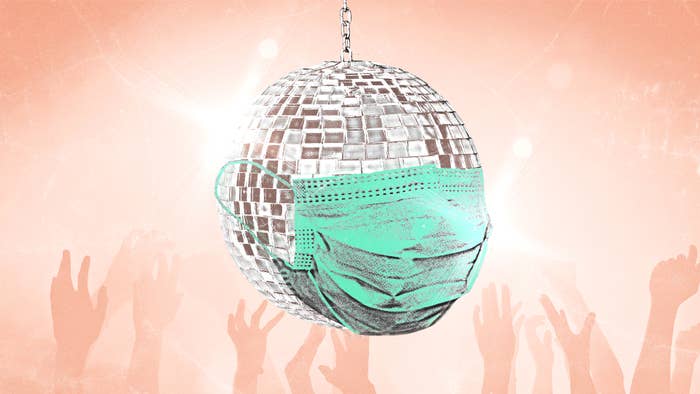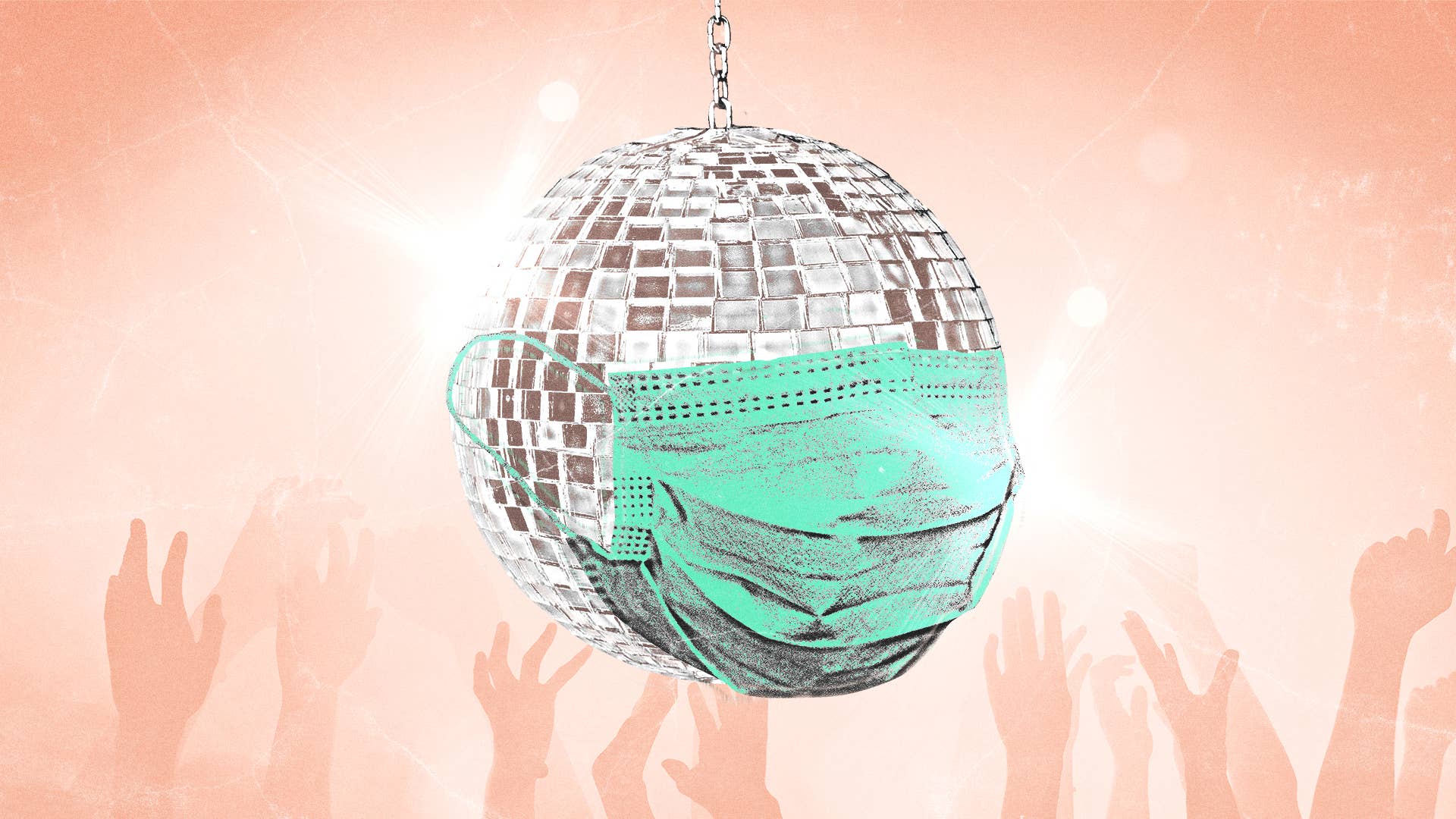
Close your eyes and try remembering the last time you were in the club. Let the cacophony of music and aimless chatter, the warmth of bodies dancing around you, and the drinks strong enough to make you forget you spent $15 on a vodka soda wash over you. Now, open your eyes to your bedroom. This is the closest you and millions of others have gotten to the club—for better or worse—in the last month thanks to the COVID-19 pandemic, which has put the global nightlife scene on pause.
In March, governors and mayors across America ordered restaurants, bars, and nightclubs to close, with the goal of precluding large social gatherings and slowing the spread of novel coronavirus. Essentially, nightlife in America is in a pandemic-induced coma, leaving bartenders, waitresses, and other staff members dependent on large gatherings without any income. It’s also left long-standing establishments facing bills that won’t stop even though the party has.
As a result, places such as these have begun crowdfunding campaigns to pay their employees and keep the lights on. Complex spoke with a number of owners and managers about the harshest realities they’ve had to face since this public health crisis started, the digital pivots they’ve made to survive, and what the future holds for nightlife in America.
Since relocating in 2015, House of Yes in New York City has been an effervescent hybrid of nightclub and circus housed in a former ice warehouse converted into a safe space that patrons must verbally accept non-discriminatory policies before entering. Since March 12, when HOY temporarily shut down, the performers walking around on stilts and the patrons sashaying around wearing their internal expression have been non-existent. HOY’s general manager, Justin Ahiyon, estimated that the business has lost “hundreds of thousands [of dollars] already,” forcing it to give up office and storage spaces and make the difficult decision to lay off some workers that have been with the company since it started.
“A lot of people are unemployed, laid off, or have no income coming in. Something is better than nothing.” - Tory Thomas, Owner, Suite Lounge
Tory Thomas, the owner of the popular Atlanta nightclub/restaurant Suite Lounge, has had to come to terms with a similarly grim reality since the establishment closed its doors on March 17 at the Centers for Disease Control and Prevention’s recommendation to postpone gatherings of more than 50 people. The owner of the six-year-old lounge estimated his business lost $500,000 to $750,000 in potential revenue in the first six weeks.
Luckily for Suite Lounge and HOY, COVID-19 doesn’t appear to have the strength to rip the clubs’ locations from the business owners’ hands yet. HOY was prescient enough to save a percentage of the company’s profits over time before the pandemic in a “last resort emergency” bank account in order to pay certain expenses. For Suite Lounge, rent wasn’t an issue for April, but there aren’t any long-term guarantees as of yet. “[Our landlord] gave us a break for April. It’s a month-to-month situation that we are grateful for,” Thomas says.
Patrons are the lifeblood of the nightlife scene; workers help keep the party flowing. It’s the personable bartender who remembers your mother’s birthday, the waitress who gives you extra wings on the house, and the unseen busboys, cooks, and maintenance workers that keep things moving are the true identity of every venue, bar, and lounge. Now, those same places are reluctantly asking their supporters to help those very same people.
“Our customers have their favorite servers and bartenders. They have people they associate with and enjoy talking to when they come by. Our GoFundMe campaign has allowed the public to donate to that person,” Thomas says.
Thomas had good reason to think his longtime patrons would be open to donating during a pandemic when Suite Lounge set up a GoFundMe on March 21. Five nights earlier, the downtown Atlanta staple held a closing event, and even as COVID-19 cases in Georgia increased by 50%, Thomas recalled having 600 to 700 people in the house that night. Unfortunately, Suite Lounge’s altruistic campaign only reached $3,000 of its $10,000 goal in its first month, a reality he fully understands. “We’re in a pandemic. A lot of people are unemployed, laid off, or have no income coming in. Something is better than nothing.”
The rampant health crisis has squeezed people’s pockets, leaving very little room for anything non-essential to open. Brooklyn bar/lounge Ode to Babel temporarily closed on March 16th and set up a GoFundMe on March 29 with a goal of $10,000. Even with only 36 donors providing $2,225 in the campaign’s first month, co-founder Marva Babel still believed “the support of our patrons is and has always been phenomenal,” she wrote.
Other businesses have fared considerably better. Brooklyn venue and metal bar Saint Vitus launched a Kickstarter campaign on April 7 raised over $92,000 in three weeks from 1,485 backers, and House of Yes’ GoFundMe for its staff raised more than $43,000 from 1,100 donors in less than five weeks. As a thank-you, HOY is putting every donor’s name on the guest list to gain free entry to all HOY parties for the first month following its reopening. Similarly, Saint Vitus offered donors rewards such as a year of free shows, photos of Nirvana playing there during the band’s early days, and Blink-182’s handwritten set-list.
“People like to say, ‘We’re gonna get through this,’ and it’s a half-truth. They forget to say the second part, which is, ‘and things won’t be the same afterward.’” - Kae Burke, Creative Director, House of Yes
Spots like these haven’t been asking for donations without providing patrons with entertainment. Digital dance floors have surfaced on Instagram Live, Zoom, and Twitch. Brooklyn’s Bed-Vyne has had borough president Eric Adams grooving in its Instagram Live DJ set. San Francisco cocktail bar Monarch has enticed people to donate to its GoFundMe by livestreaming a DJ set on Twitch every single day since it closed on March 14. HOY has hosted digital dance parties on Twitch and Zoom thanks to the venue’s music director David Kiss, who set up the company’s broadcasting capabilities.
Businesses are also offering food and drink deliveries to draw donations. Ode to Babel began providing cocktails for delivery to parts of Brooklyn in mid-April, after applying for, and not securing, federal funding. The drinks are "the most appropriate thing to remain in touch with our guests and [to] keep some revenue to cover some of the general operating costs and support our collaborators,” Babel says.
The 35-year-old San Francisco venue DNA Lounge is also offering alcohol deliveries, as well as expanding its pizza delivery service via Grubhub, Doordash, Postmates, and Allset.
But nightspots are also looking toward the future. After most had been closed for a month, the White House laid out plans for reopening America’s economy in three phases. Complex reached out to other high-profile clubs about their post-pandemic strategies, but popular places such as Miami's Club LIV declined to comment for this story. States including Georgia, home to Suite Lounge, have already begun reopening certain businesses. Georgia governor Brian Kemp did not give a timeline for when clubs and niteries can restart, but Thomas is ready to make changes to Suite Lounge once he receives the all-clear.
“We ordered plastic protective equipment masks you see in the hospitals. We think our servers are going to be wearing those until everything blows over. We ordered the thermometers to read someone’s temperature off their foreheads,” Thomas says. “I think it starts there. The customers are not going to come back unless they feel safe, so we have no problem checking [the staff’s] temperature before they come in.”
Governor Kemp did allow restaurants to reopen on April 27 under strict guidelines. At first, Thomas was hesitant to reopen until he was confident Suite Lounge could accommodate the new guidelines. But he had to expedite the reopening to keep up with bills.
“Once restaurants could legally reopen, the creditors started asking to be paid,” Thomas wrote. “It’s put businesses in a difficult position. You either open at reduced capacity and go bankrupt slowly or stay closed and go bankrupt quicker.”
“The drinks are the most appropriate way to remain in touch with our guests and support our collaborators.” - Marva Babel, Co-Owner, Ode to Babel
On May 13, Suite Lounge reopened its doors for dine-in and takeout service with tables separated six feet apart from one another and patrons’ temperatures being checked before entry. Employees must wear masks and gloves, get temperature checks before working, and constantly sanitize surfaces.
Masks and gloves in the club may sound like a scene from Black Mirror, but it could be the new normal when these places resume, as the White House has warned of a second wave of COVID-19 infections coming in the fall and winter. HOY’s co-founder and creative director Kae Burke have seen well-attended cabarets and New York City’s nightlife survive a debilitating recession and steep rises in rents and knows COVID-19 will leave lasting effects on the scene. On one hand, people spending hundreds of thousands of dollars and dancing in front of their computers’ webcams in order to support establishments they can’t visit could help the culture to “be recognized on a higher level, with a deeper purpose than just being loud and selling drinks,” according to Burke.
On the other, having the experiences they care for taken from them so abruptly and absolutely could ensure that “a knot of fear will exist in our collective subconscious for quite a while.” The future of going out with your friends and family is greatly impacted by this moment in time, but nightclubs such as these and others are resilient and more prepared to reopen with a positive outlook.
“The more you experience yourself prevailing through the hardest times imaginable, the more you believe that you can actually get through it. People like to say, ‘We’re gonna get through this,’ and it’s a half-truth. They forget to say the second part, which is, ‘and things won’t be the same afterward,’” Burke says.

